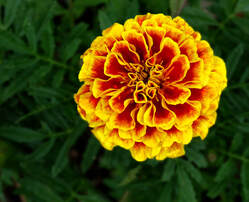 photo credit: Jim Evans photo credit: Jim Evans The beautifully bright French marigold with its yellow, orange and mahogany blooms proves to be a bit too attractive to beneficial arthropods surrounding sweet corn fields. During the 2021 field season, researchers in the Hooks Lab and UMD Extension were busy, “Evaluating French marigold as a border insectary plant for the enhancement of beneficial arthropods in sweet corn plantings.” They found that while the marigold plants were indeed attracting beneficial arthropods such as encyrtid wasps and lady beetles, the beneficials remained near the marigold strips rather than dispersing throughout the sweet corn plots. The authors concluded that “when used as a border insectary plant, marigold may not improve biological control through predation and parasitization of economically important insect pests in sweet corn plantings”. Moreover, in the current study, marigold may have functioned as a natural enemy sink by luring natural enemies from sweet corn border rows. Share your colleagues work with your networks. Here are a few posts ready to share via twitter and facebook.
written by: Ebony Michelle Argaez
Big data is the fuel of the 21st century, it is a part of our everyday lives; we produce and consume it. One example is the use of various types of data acquired from social media apps that are then used to deliver ads to targeted audiences. Yet, big data is also used in academia, health, science, and government for addressing research questions. What is big data? Big data can be measured by its volume, variety, and velocity. Big data contains high volume in the form of many individual observations. Variety refers to many attributes associated with these observations. Velocity is the repetition of that volume and variety across some other dimension (e.g., time or populations). When preexisting big data sets are used in ecological studies, it is called ecoinformatics [1]. Dr. Michael Crossley, an Assistant Professor and Agricultural Entomologist in the Department of Entomology and Wildlife Ecology at the University of Delaware, uses ecoinformatics to understand how insect ecology is affected by changes in agricultural landscapes. |
Categories
All
Archives
June 2024
|
Department of Entomology
University of Maryland
4112 Plant Sciences Building
College Park, MD 20742-4454
USA
Telephone: 301.405.3911
Fax: 301.314.9290
University of Maryland
4112 Plant Sciences Building
College Park, MD 20742-4454
USA
Telephone: 301.405.3911
Fax: 301.314.9290


 RSS Feed
RSS Feed




